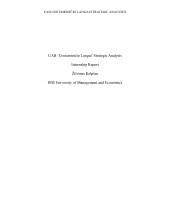Strategic Analysis



Strategic Analysis.
The entrance to international markets is currently considered as an important strategic objective for Uostamiesčio Langai. It is even reflected in Company’s vision: “Our strategic objective is to increase the value of buildings and to make a better living and working environment for people worldwide. We aim to achieve this by cooperating with our partners and offering the lowest prices for the highest quality’’ (Internal Company’s data). The mean of growth is through increase of exports to foreign markets, especially Europe.
The uPVC profile windows that are produced by the company might be grouped into three different categories: Ultimate 70, Ultimate 62 and Eurologik. The Ultimate 70 are considered as trustworthy and economic window systems that reaches the thermal insulation level down to 1.4 W/m²K. Unfortunately, such window frames are available only in white colours and meets only the minimum burglar resistance level (class 1). Meanwhile the system Unilogik 62 is known due to its outstanding thermal insulation (down to 0.77 W/m²K) and the high burglar resistance level (class 4 available – triple glazing). Such window frames are available in multiple colors which often meets the demanding designers’ requirements. Lastly, the Eurologik profile window systems are considered as a very close substitute to aluminium profile system 59. It is an economic solution with a low thermal insulation level and low burglar resistance level. Such systems (as well as concept 59) fit best for indoor placements, winter gardens or for the projects at the warm climate zones.
In order to analyse the macro environment, PESTEL analyses was chosen. Table below (see table 1) depicts how each of the factor influences Lithuania‘s window profile industry.
Membership at the European Union grants favorable conditions for exporting company’s production within EU due to free capital movement and zero tariffs.
According to Lithuanias economic indicators published by Lietuvos Statistikos Departamentas, economy demonstrated further recovery in 2013: real GDP grew by 3.3%, inflation decreased up to 1.2%, construction sector in quarter increased by 2.8%.
In according to Sweedbank economic outlook (2014) assumingly after the adaptation of common European currency, the strong demand for real estate should decrease, however, the construction sector is still expected to show positive figures.
The popularity of environmental friendliness increases the demand for wooden profile windows what results in decreased sales of the company, as the company does not produce wooden profile windows.
The presence of the window systems renovation companies results in a slight decrease in sales due to the loss of consumers who decide to refurbish its windows rather than purchasing the new ones.
Sustainable urban-renewal projects that are supported by European Commission (EC) and the European Investment Bank (EIB) under the program JESSICA had positive effects on constructions industry:
Looking at the macro environment, the industry does not face any significant risks since political and economical situation in Lithuania is considered as relatively stable. The macroeconomic adjustments that were taken after the Global Financial Crisis (2007-2008) are paying off with balanced growth and resilience. According to International Monetary Fund announcement (2013) the GDP (Gross Domestic Product) is approaching the pre-crisis level and the growth is expected to reach 3¬Ω% in 2014. These economic figures indicate positive results for construction sector, as the economy is expected to grow and the level of disposable income is expected to increase.
- Economy & Finance Researches
- Microsoft Word 123 KB
- 2015 m.
- English
- 25 pages (4601 words)
- Zilvinas

















